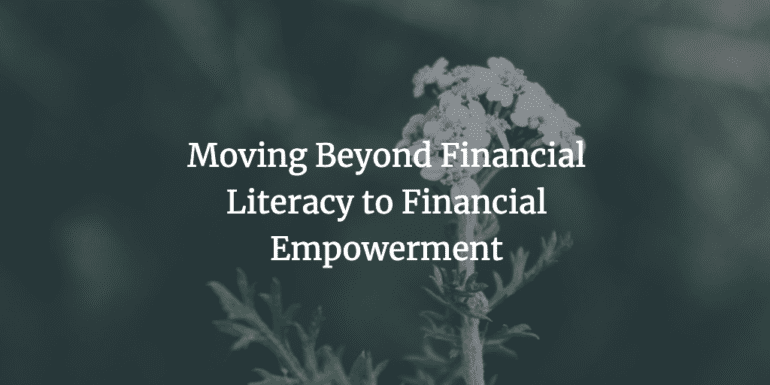Financial Literacy Month ended yesterday (yes, April is officially Financial Literacy Month) and I have been thinking a lot about financial literacy and its link to financial health. Some of my thinking was prompted by this recent column in American Banker by Jennifer Tescher, the CEO of the Center for Financial Services Innovation (CFSI). Jen is one of the most knowledgeable and influential people when it comes to financial health and someone I always pay attention to (you can listen to my interview with her last year here).
I have also just finished listening to the sessions on the Financial Health and Inclusion track at LendIt Fintech USA 2019 that happened in San Francisco just a few weeks ago. I helped put this track together and I was delighted not just by the quality of the speakers we attracted but also by the interest from the attendees. Pretty much every session on this track was packed which was not the case last year or the year before that. The fintech community is becoming more engaged with the topic of financial health and I couldn’t be more pleased about that.
But back to the American Banker op-ed. Jen made the case that financial literacy programs are not working. The reality is teaching people about finance, the goal of Financial Literacy Month, has not made much of an impact on financial health. It does not lead to lasting knowledge gain and it rarely leads to changes in behavior. Here is what she says is needed instead:
What financially vulnerable people need is access to high-quality products and experiences built to help them succeed by people who truly understand their financial situations and foibles.
I want to reiterate this one point. They need “high quality products and experiences built to help them succeed”. This is it in a nutshell. The good news is that there is a new group of entrepreneurs creating high quality products that could really make a difference here.
This brings me back to the LendIt Financial Health track. One session that I thought was super interesting was around employer based financing. Many of the most financially vulnerable people have jobs but often need to take out short term loans to make it through to the next payday. Far better they get this financing through their employer than via a payday lender. There are several companies in this space doing great work in creating high quality products: Even, PayActiv, TrueConnect and HoneyBee all offer options to employers that help their employees who need access to quick financing. Even has a groundbreaking deal with Walmart that has resulted in 300,000 employees using their pay advance app.
These programs all rely on employers signing up for one of these offering. While I think they will become ubiquitous over time we are still a long from that happening. So, people who are struggling need more options and many more companies are tackling financial health issues in different ways.
Another great session at LendIt was focused around products that have financial health benefits built in to their design. Each of these companies are approaching the problem differently but some of them have significant traction and are really making a difference. MoneyLion has four million users and they are focused on ending financial stress for all Americans by taking a holistic approach and being proactive in providing help. Dave helps the 30 million people who are hit by overdraft fees each year by advancing $75 from their next paycheck. Tally is a fully automated debt manager to help consumers get out of credit card debt. Learnlux is a digital financial wellness platform that helps build digital financial plans for the mass market, they are currently offering this through employers.
While we had other great sessions at LendIt on financial health I don’t want this to become a promotional piece. Of course, this is just the tip of the iceberg. There are many other fintech companies attacking the challenge of financial health. One area that is rarely focused on is the income side of the equation. Steady is a fintech company that helps people maximize their income by providing sophisticated tools for finding a second job. Dave has a similar offering called Side Hustle.
The big challenge for the financially vulnerable is that it is expensive to be poor and getting more so. Many of the aforementioned companies are focused on taking away some of these costs. But more needs to be done. Eventually, we need to get to a point where these products become invisible to consumers so the cost of being poor is vastly reduced without these consumers having to be proactive. That is the way well designed products should work, it gives people a sense of control and financial empowerment.
We live in a country where the majority of people experience financial stress on a regular basis. I think the tide has turned and fintech is starting to take this problem seriously. And this gives me reason to be optimistic about the future of financial health.


